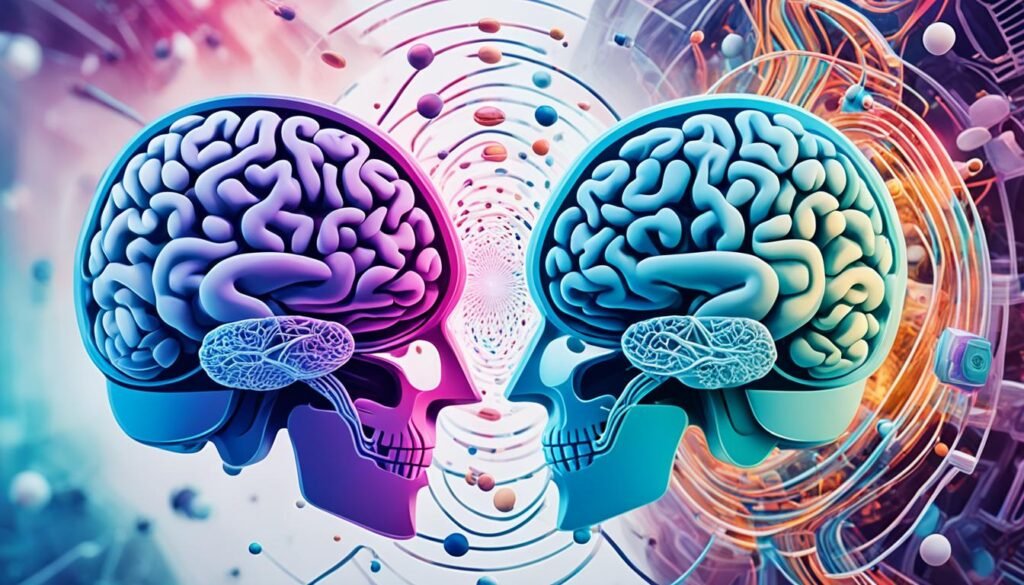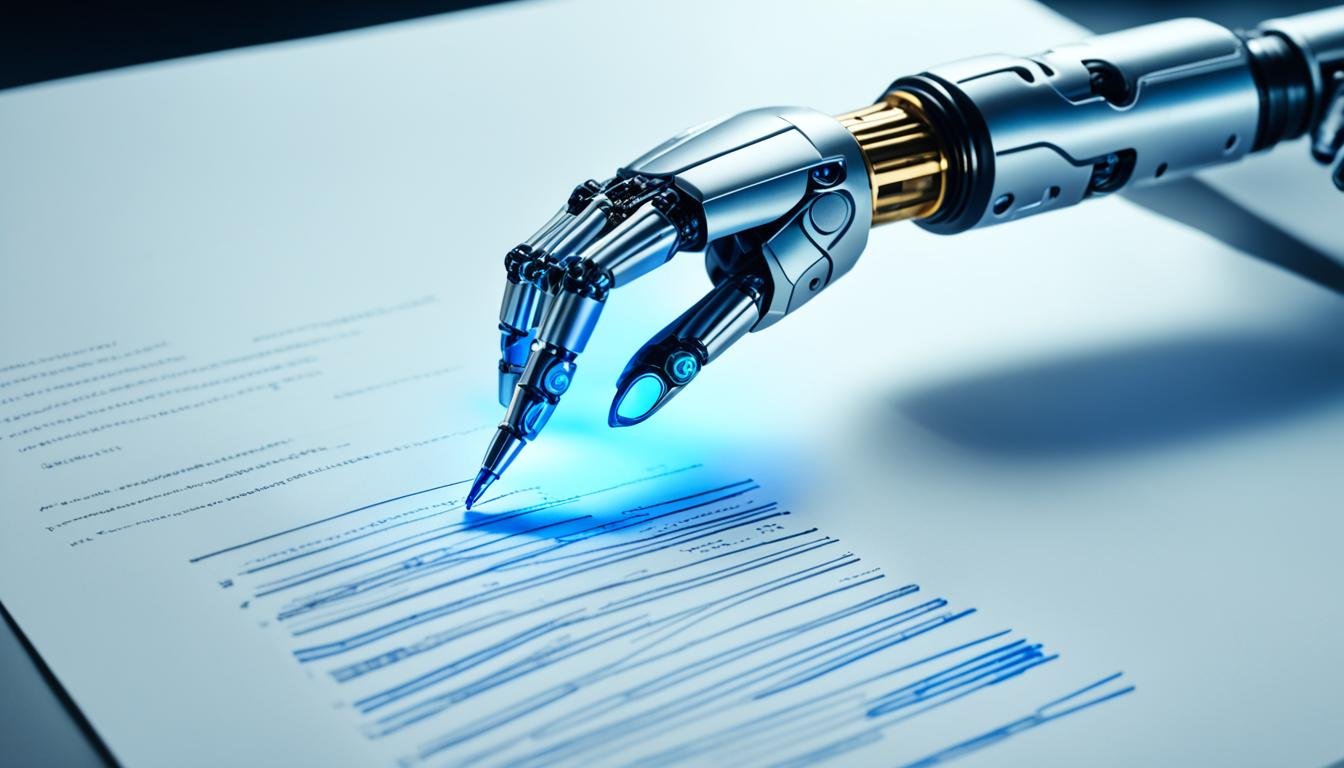AI is changing the world fast, and a key fact has caught our attention: 49 news outlets, like CNET and Buzzfeed, now use AI to write articles. This big change has started a lively debate. People wonder if AI will take over human writers’ jobs and change how we create.
AI isn’t just for news. Hollywood writers have gone on strike to protect their jobs and rights. They don’t want AI to affect their pay or credits. Now, companies can make 10,000 articles where before they could only manage one, which could hurt freelance writers’ careers.
Key Takeaways
- AI is already generating content for major news outlets, raising concerns about the future of human writers.
- Hollywood writers are striking to protect their compensation and credits from AI-generated work.
- Companies can now produce 10,000 articles with the resources previously needed for one, impacting freelance writers.
- The writing industry is undergoing a significant shift as AI advances in content creation.
- The rise of AI-powered writing tools has sparked a debate about the role of AI in the creative process.
The AI revolution is changing the writing world in big ways. We’ll look at how AI writing assistants are becoming more common. We’ll also discuss the debate between AI and human writers. And we’ll talk about what this means for the future of stories and books.
The Rise of AI Writing Assistants
ChatGPT and the AI Writing Revolution
The writing world is changing fast, thanks to AI technology. ChatGPT, made by OpenAI, is leading this change. It can write text that sounds like a human on many topics. This has made many writers and creators both excited and worried about their future.
Capabilities and Limitations of AI in Writing
AI tools like ChatGPT can write content quickly and correctly. But, they often lack the creativity and emotional depth of human writing. They’re great at research, checking facts, and fixing grammar. Yet, they can’t match the nuance, personal touch, and originality of human work.
Understanding what AI can and can’t do is key as it gets better. This helps us use it wisely.
| Capabilities of AI in Writing | Limitations of AI in Writing |
|---|---|
|
|
As AI changes writing, writers and creators must adapt. They should use AI’s strengths but know its limits. Finding a balance between human creativity and AI efficiency is crucial. This way, writing can stay engaging and vibrant despite new technology.
AI vs. Human Writers: Comparing Creativity and Nuance
The rise of AI writing tools is changing how we publish content. But, can AI really match the creativity and depth of human writing? AI tools are great at making content that’s technically sound. Yet, they might not capture the unique views and personal touches that human writers bring.
Studies show that AI models use patterns and data to create content. This limits their ability to make truly new and groundbreaking work. Unlike humans, AI lacks emotional smarts and the deep understanding of human life. This makes it hard for AI to tell complex stories, use subtle meanings, and make readers feel connected.
An industry expert says AI can make content that’s right for grammar and search engines. But, it often misses the deep insights and emotional connection that human writing has. Many in the writing world agree. They say AI still can’t match the creativity and nuance of great writing.
“AI can produce content that is grammatically correct and optimized for search engines, but it often lacks the depth of insight and the ability to connect with readers on a deeper, emotional level that sets human-written content apart.”
The debate on AI vs. human writers will keep going as tech gets better. But for now, it’s clear that human writers bring something special to storytelling and writing. Their unique views, emotional touch, and creative spark are key to great writing.

| Attribute | AI Writers | Human Writers |
|---|---|---|
| Creativity | Limited to recombining existing data and patterns | Able to generate truly novel and original ideas |
| Emotional Intelligence | Lack the ability to connect with readers on a deeper, emotional level | Possess the empathy and intuitive understanding of the human experience |
| Nuance | Struggle to convey subtle meanings and multiple interpretations | Skilled at crafting content with layers of depth and complexity |
| Adaptability | Constrained by the data and algorithms they are built upon | Able to adapt and respond to changing circumstances and audience needs |
The Impact of AI on Writing Professions
AI-powered writing tools have changed the writing industry a lot. They bring both challenges and chances for those in this field. The impact of ai on writing professions is clear, with both job disruptions from ai and opportunities from ai in writing on the table.
Potential Job Disruptions and Opportunities
Studies say AI will soon be a big part of writing jobs, changing many parts of the work. The Marketing AI Show episode pointed out that writers who don’t use AI might get left behind. This shows how important it is for writers to learn and use these new tools.
But AI’s effect on writing isn’t just about losing jobs. The AI for Writers Summit in March 2023 will explore AI writing tech and new career paths. People can get a FREE pass or a $99 pass, with extra on-demand access for $99. This shows how much interest and chance there is in this area.
| AI Impact on Writing | Potential Job Disruptions | Emerging Opportunities |
|---|---|---|
| ChatGPT created shockwaves in various industries, including content writing | AI tools can produce hundreds of words in less than a few minutes | More time for engaging in reading and writing hobbies |
| Google’s “helpful content” update flags “low value” content, impacting search rankings | The time to craft a quality article is approximately half with AI tools | Embracing new tools to stay competitive in the market |
| Detailed instructions, guidance on tone, and re-iterations with AI tools are essential for valuable content | Writing responsibilities have shifted to include being an AI writer tool expert and editor | Adapting services to AI writing can prevent underscoring human-written content |
The writing industry is always changing, and staying up-to-date with tech and trends is key. By using AI tools and learning new skills, writers can thrive in the changing world of content creation.
Ethical Concerns and Challenges with AI-Generated Content
AI is changing how we make content, but we must think about the ethical issues it brings. Using AI to write and create content makes us wonder about bias, privacy, accountability, and who owns the content.
Bias in AI-generated content is a big worry. AI learns from data, which might have biases. This could mean AI content could be unfair to some groups. We need to make sure AI is fair and includes everyone.
Privacy is also a big concern. AI-generated content uses personal data, which makes us think about if people know and agree to this. We must protect people’s right to privacy.
When AI-generated content makes mistakes or causes harm, it’s hard to say who is responsible. We need clear rules to handle this.
- Intellectual property rights are tricky with AI-generated content. It’s hard to tell if it’s original or who owns it.
- We need to work on reducing bias, protecting privacy, making sure people are accountable, and solving intellectual property issues with AI content.
AI-generated content has its perks like being efficient and consistent. But, we must handle the ethical issues carefully. Finding a balance between AI’s benefits and ethical values is key for creators, businesses, and policymakers.

“The rise of AI-generated content presents both opportunities and ethical pitfalls that must be addressed with care and nuance.”
will ai replace writers
The rise of AI writing assistants like ChatGPT has sparked a debate on the future of human writers. Some think AI will replace writers, while others believe human creativity and emotional depth will always be valued.
Many writers worry about AI’s threat, fearing their jobs could be taken over by machines that work faster and more efficiently. But, some writers see AI as a way to boost their productivity and skills.
Marche suggests writers should adapt and see AI as a creative tool, not just a threat. AI can quickly come up with ideas, helping writers overcome writer’s block and boost productivity. It can also do tasks that take humans a long time, giving writers more time for creative work.
| AI as a Threat to Writers | AI as a Tool for Writers |
|---|---|
|
|
The debate on whether AI will replace writers or help them is ongoing. As AI technology gets better, it’s important for writers to adapt and use AI to improve their work, not just see it as a threat.
Adapting to the AI Writing Era
The AI writing revolution is changing the industry fast. Writers need to learn new skills to stay ahead. Tools like ChatGPT are making waves, but instead of fearing them, smart writers see them as helpful tools.
Developing New Skills and Strategies
For success in the AI age, writers should work on their strategic thinking, data analysis, and understanding their audience. AI is great at research, grammar, and SEO, but humans are unbeatable in creativity, emotional depth, and storytelling.
Using AI as a partner, not a replacement, is a smart move. Writers can guide AI to create fast, efficient text while adding their own touch. This means changing how writers work, blending AI into their process smoothly.
Specializing in areas where AI falls short can set writers apart. Being an expert in a niche means offering insights AI can’t match. This strategy can make writers more valuable.
Also, embracing multimedia and interactive content can make writers more engaging. As how we consume content changes, writers who use video, audio, and data visualization will do well.

The secret to succeeding with AI is to see it as a tool, not a threat. By learning new skills, using AI wisely, and focusing on what humans do best, writers can not only survive but flourish in this new era.
The Future of Storytelling and Literature
Artificial intelligence (AI) is changing the world of writing. This has sparked a big debate about the future of storytelling and literature. Some see AI as a way to make writing faster and cheaper. Others worry that it could take away the human touch and creativity.
There’s a fear that AI writing tools like ChatGPT might lead to stories that are too similar and lack the depth of human stories. GPT-4 says AI will replace many writers but won’t take over completely for several reasons. It’s still unclear if AI can match the power of human storytelling.
But AI could also open new doors for storytelling. For example, author Stephen Marche used AI to create a unique mystery story. The future asks us to work with AI, adjust to new job demands, and use both AI and human ideas to stay relevant in an AI world.
The debate on AI’s impact on storytelling and literature is ongoing. While there are worries about losing the human touch, AI could also bring new ways to tell stories. The key might be finding a balance between AI’s efficiency and human creativity.
“The future requires individuals to team up with AI, adapt to changes in job processes, and leverage both AI tools and human inspiration to remain relevant in an AI-driven age.”
Striking a Balance: AI and Human Collaboration
AI writing assistants are getting better, making us wonder about the future of human writers. AI won’t replace professional writers, but it will change the industry a lot. The secret is finding a balance between AI’s strengths and what human writers do best.
Leveraging AI as a Writing Assistant
Smart writers are finding ways to use AI as a big help. AI can write fast and efficiently, helping writers work better and do more. AI writers can quickly make blog posts, emails, reports, and books by copying human writing styles. This lets human writers focus on being creative, telling stories, adding personal touches, and making content emotionally engaging.
AI also helps with SEO optimization, fact-checking, and coming up with ideas. Working together, AI and human writers make sure the final product is both smart and full of human touch. This mix makes sure the content is top-notch.
“The future of writing lies in the balance between AI and human collaboration. By using AI as a writing assistant, we can unlock new levels of efficiency and productivity, while preserving the essential human element that captivates audiences.”
As AI changes writing, the best writers will use these tools well in their work. By balancing AI and human writing, professionals can improve their skills, reach more people, and make content that really speaks to their audience.

Use Cases for AI Writing Tools
AI writing tools are becoming more common, and it’s key to know how they’re used. They don’t aim to replace human writers but to help them. These tools act as powerful assistants, boosting creativity and making writing easier.
AI is great at making news articles and content that follows set patterns. It can quickly produce articles, social media posts, and more by analyzing lots of data. This is super helpful for when you need to write a lot or fast, letting writers focus on harder, more creative tasks.
AI also helps with everyday writing tasks like writing recommendation letters. It gives writers a starting point or template. This saves time and keeps writing consistent. It’s really useful for people like teachers or HR who write a lot of similar documents.
Even in storytelling and literature, AI is making its mark. Canadian author Stephen Marche used an AI tool to write a mystery novella. This shows AI’s potential in creative writing, even if it’s still new.
| Use Case | Description | Benefits |
|---|---|---|
| News and Content Generation | AI can quickly generate articles, social media posts, and other content by analyzing data and identifying common structures and language. | Saves time, allows human writers to focus on more complex tasks. |
| Routine Writing Tasks | AI can provide templates and starting points for writing recommendation letters, reports, and other standardized content. | Improves consistency, saves time for human writers. |
| Storytelling and Literature | AI tools can assist in the exploration of new forms of creative expression, as demonstrated by author Stephen Marche’s use of AI in generating a mystery novella. | Unlocks new possibilities for literary and storytelling innovations. |
As AI writing tools get better, we see they have many uses. They help make content creation faster and boost creativity. They shouldn’t replace human writers but can be great helpers. They let writers use their talents to create even more amazing content.
Conclusion
The rise of AI in writing has changed the writing world a lot. AI can do things like keyword research, proofreading, and even write scripts. But, the future of writing is complex and has many sides to it.
There are worries about AI taking over and making writing less human. But, we don’t have to see it as a fight between AI and human writers. Instead, we can work together. Writers can use AI to help them and try new things in their work.
This way, writers can keep up with AI and still keep their work feeling human. The key is to use AI as a tool, not a replacement.
The future of writing will depend on how everyone – writers, publishers, and the industry – use AI. Finding a balance between AI’s power and human creativity is key. This balance will help writers and readers both.
In the end, the future of writing is about combining human and artificial intelligence. This way, we can use the best of both to make amazing, meaningful literature.
FAQ
Will AI replace human writers?
AI is getting better at writing like humans, but it won’t replace human writers fully. It might change how we write and what skills writers need. But, human creativity, feelings, and personal touch are still very important.
What are the capabilities and limitations of AI writing tools?
AI writing tools can make content that’s technically correct. But, they often miss the unique view, creativity, and feelings that humans bring. They use patterns and data, which can make their content seem unoriginal.
How can writers adapt to the AI-driven writing landscape?
Writers should see AI as a tool to help them work better and faster. They should keep being the creative force behind the content. Learning new skills like strategic thinking and understanding what readers want is also key.
What are the ethical concerns and challenges with AI-generated content?
There are big ethical worries about AI content, like spreading false info, more racial bias, and making it hard for teachers to know if students wrote it. There’s also less privacy.
How can human writers and AI collaborate in the future of storytelling and literature?
The future might see writers and AI working together. Writers could use AI to try new ways of telling stories. They would guide the AI to match their vision.
What are some use cases for AI writing tools?
AI writing tools are already used for things like news articles and content that follows set styles. They can also help with writing things like recommendation letters, giving humans a base to work from.
